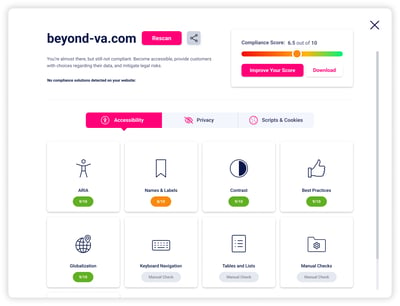Australian Disability Discrimination Act (ADDA)
What is the ADDA?
The Australian Disability Discrimination Act (ADDA) protects the rights of people with disabilities and promotes equal opportunities and access to services for all Australians. In recent years, the Act has been used to enforce accessibility requirements for websites and digital content, recognizing the increasing importance of digital accessibility.
The ADDA defines a person with a disability as someone who has a physical, intellectual, sensory, or psychiatric disability. It covers disabilities that are temporary or permanent, and disabilities that may or may not be visible. The act also protects people who have a disability in the past, such as those who have recovered from an illness or injury.
Website Accessibility Score for Free

Who is affected by the ADDA?
Under the ADDA, organizations that provide goods or services to the public must ensure that people with disabilities can access and use their services, including their websites and digital content. This includes government agencies, businesses, non-profits, and other organizations that provide services to the public.
What are the ADDA requirements?
To comply with the ADDA's accessibility requirements for websites, organizations must ensure that their websites are accessible to people with disabilities, including those who are blind or visually impaired, deaf or hard of hearing, or have physical or cognitive disabilities. This includes providing alternative text for images, ensuring that videos are captioned, using clear and simple language, providing keyboard navigation, and more.
While compliance with the WCAG is not explicitly required under the ADDA, it is widely recognized as a best practice for ensuring digital accessibility.
What are the costs associated with non-compliance?
Organizations that fail to comply with the ADDA's accessibility requirements for websites may face legal action and penalties. The Australian Human Rights Commission is responsible for enforcing the ADDA and investigating complaints of discrimination. In some cases, organizations may also face reputational damage and lost business if their websites are not accessible to people with disabilities.
How can I make my website ADDA compliant?
How can Clym help?
Clym believes in striking a balance between digital compliance and your business needs, which is why we offer businesses the following:
- All-in-one platform: One interface combining Privacy and Accessibility compliance with global regulations, at an affordable price;
- Seamless integration into your website;
- Adaptability to your users’ location and applicable regulation;
- Customizable branding;
- ReadyCompliance™: Covering 30+ data privacy regulations;
- Six preconfigured accessibility profiles, as well as 25+ display adjustments that allow visitors to customise their individual experience.
You can convince yourself and see Clym in action by booking a demo or reaching out to us to discuss your specific needs today.
Table of contents
Questions?
If you would like to learn more, our compliance experts are happy to support you..
Leave us a Message